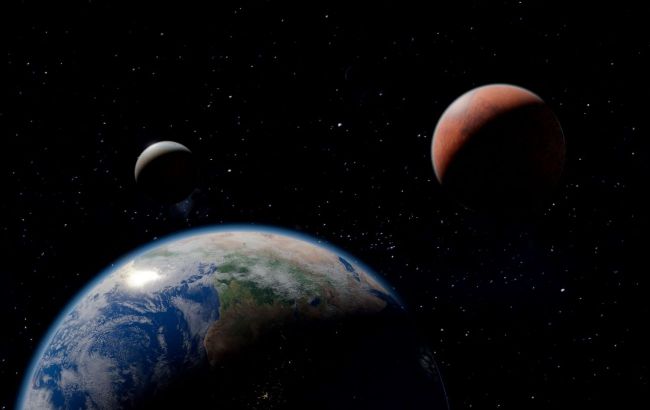'Butterfly Effect': Scientists explain how Mars can affect Earth's climate
 Earth's climate may depend on Mars (photo: freepik.com)
Earth's climate may depend on Mars (photo: freepik.com)
The gravitational forces of Mars may be sufficient to "perturb" the World Ocean and significantly influence Earth's climate. According to scientists, this process is prolonged but entirely plausible.
RBC-Ukraine explains how Earth's climate may depend on Mars.
In preparing the material, the following sources were used: New Scientist, Business Insider, Wikipedia.
Research findings
Scientists have long known that variations in Earth's orbit around the Sun affect the planet's climate. The so-called Milankovitch cycles are periodic and span tens or even hundreds of thousands of years.
However, research by scientists from the University of Sydney has recently identified the so-called Great Cycle, lasting 2.4 million years. According to scientists, it is "governed" by Mars and has influenced Earth's ocean currents for at least 40 million years.
Experts note that Mars's gravitational pull may be strong enough to stir Earth's water and displace deep-sea and oceanic deposits.
This conclusion was reached after thoroughly analyzing approximately 300 deep-sea cores (columns of rock obtained during drilling).
The "Butterfly Effect"
Mars's orbit is approximately 1.5 times farther from the Sun than Earth's. However, every 780 days, the Red Planet and Earth come closest to each other (the distance between them varies from 56 to 401 million kilometers).
These planetary close encounters are called oppositions.
According to Professor of Geophysics at the University of Sydney's School of Earth Sciences, Dietmar Müller, at first glance, the distance between Mars and Earth is so great that it's difficult to imagine any significant gravitational influence.
"But there are many factors that can amplify even small changes. The impact of Mars on Earth's climate is similar to the butterfly effect," the scientist emphasized.
How Earth's climate may depend on Mars
The analysis results of deep-sea cores indicate that during periods of stable ocean currents, water deposits "settle in stable layers," while unusual currents and eddies displace deep-sea and oceanic deposits elsewhere.
According to scientists, the absence or interruptions in sedimentary records coincide with times when Mars's gravitational influence on Earth is strongest.
Based on this, they hypothesize that the Red Planet, while not noticeable at first glance, still affects Earth's orbital stability.
According to scientists, Mars alters the level of solar radiation reaching Earth during the Great Cycle. Additionally, the Red Planet influences the climate by altering currents and creating ocean eddies.
Professor Benjamin Mills from the School of Environmental Sciences at the University of Leeds in the United Kingdom remarked that many people have observed the outcomes of these cycles, which have persisted for millions of years, in a variety of geological, geochemical, and biological data. He mentioned the period known as the Cambrian explosion as an example.
In his opinion, recent research "helps solidify these ideas as key components of environmental change."

